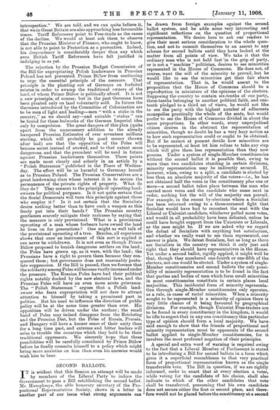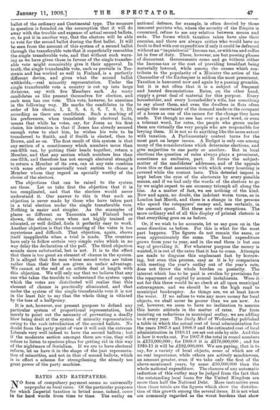SECOND BALLOTS.
IT is evident that this Session an attempt will be made by members of the Liberal Party to induce the Government to pass a Bill establishing the second ballot. Mr. Humphreys, the able honorary secretary of the Pro- portional Representation Society, shows in a letter in another part of our issue what strong arguments can be drawn from foreign examples against the second ballot system, and he adds some very interesting and significant reflections on the question of proportional representation. We desire here to ask our readers to give their most serious consideration to the whole ques- tion, and not to commit themselves to an assent to any scheme for second ballots until they have looked at the matter from all points of view. We take it that the ordinary man who is not held fast 'in the grip of party, or is not a " machine " politician, desires to see minorities represented in the House of Commons. He does not, of course, want the will of the minority to prevail, but he would like to see the minorities get their fair share of representation. That is, he would assent to the proposition that the House of Commons should be a reproduction in miniature of the opinions of the electors. Supposing the country to contain six-tenths of one party, three-tenths belonging to another political faith, and one-' tenth pledged to a third set of views, he would not like to see the party with the highest numbei of adherents monopolise practically the whole of the seats, but would prefer to see the House of Commons divided in about the same proportions. In other words, every unprejudiced citizen desires in the abstract the representation of minorities, though no doubt he has a very hazy notion as to how such representation could or ought to be obtained. But if he cannot at present decide how minorities are to be represented, at least let him refuse to take any step which will give them less representation than they now possess. Under a system of single-Member constituencies without the second ballot it is possible that, owing to more than two candidates standing in certain divisions, minority representation may be indirectly secured. If, however, when, owing to a split, a candidate is elected by less than an absolute majority of the voters—i.e., he has not obtained half the votes in the constituency plus one or more—a second ballot takes place between the man who carried most votes and the candidate who came next in. order, nothing but the will of the majority can prevail.. For example, in the recent by-elections where a Socialist has been returned owing to a three-cornered fight that Socialist would have had to recontest the seat with the Liberal or Unionist candidate, whichever polled more votes,• and would in all probability have been defeated, unless he could have bought support from the Unionists or Liberals, as the case might be. If we are asked why we regard the defeat of Socialists with anything but satisfaction,. and whether we really want to see them represented, our answer is plain. We detest Socialism, but as long as there are Socialists in the country we think it only just and right that they should have representatives in the House. Yet under a second ballot, rigidly applied, it might well be that, though they numbered one-fourth or one-fifth of the electors, not one would be elected. Under a system of single- Member constituencies and second ballots the only possi- bility of minority representation is to be found in the fact that parties and bodies of men which form small minorities in most constituencies constitute in certain places local majorities. This incidental form of minority representa- tion through single-Member constituencies only operates,, as a rule, in cases of racial minorities. When a minority sought to be represented is a minority of opinion there is very little chance of it being favoured by geographical divisions. For example, though Unionist Free-traders are to be found in every constituency in the kingdom, it would be idle to expect that in any one constituency this particular, type of opinion should form a local majority. We have said enough to show that the friends of proportional and , minority representation must be opponents of the second ballot applied to single-Member constituencies, for it involves the most profound negation of their principles.
A special and extra word of warning is required owing to the fact that a Liberal Member of Parliament is stated , to be introducing a Bill for second ballots in a form which gives it a superficial resemblance to that very practical form of proportional representation known as the single transferable vote. The Bill in question, if we are rightly informed, seeks to enact that at every election a voter while voting for the candidate of his choice, shall also indicate to which of the other candidates that vote shall be transferred, presuming that his own candidate does not secure either the first or second place, and there- fore would not be placed before the constituency at a second ballot of the ordinary and Continental type. The measure in question is founded on the assumption that it will do away with the trouble and expense of actual second ballots, or, to put it in another way, that the electors will be able to vote for the second ballot during the first ballot. It will be seen from the account of this system of a second ballot through the transferable vote that it superficially resembles the single transferable vote, and that without such warn- ing as we have given those in favour of the single transfer- able vote might conceivably give it their approval. In truth, the single transferable vote, such as prevails in Tas- mania and has worked so well in Finland, is a perfectly different device, and gives what the second ballot withholds,—real minority representation. Under the single transferable vote a country is cut up into large divisions, say with five Members each. As many candidates as like present themselves for election, and each man has one vote. This vote, however, he exercises in the following way. He marks the candidates in the order of his choice, 1, 2, 3, 4, 5, 6, 7, 8, 9, 10, according as there are candidates. Such a marking of his preferences, when translated into electoral facts, means that while he votes, say, for Jones as his first choice, his intention is that if Jones has already secured enough votes to elect him, he wishes his vote to be transferred to Smith, and if Smith is elected, then to Brown, and so on. The first result of this system is that any section of a constituency which numbers more than one-fifth can, by putting their heads together, return a Member, and that any section which numbers less than one-fifth, and therefore has not enough electoral strength to return a Member of its own, can at any rate combine with some other numerically weak section to choose a Member whom they regard as specially worthy of the choice of the electors.
The objections that can be raised to the system are three. Let us take first the objection that it is too complicated, and that the electors would never understand it. Our answer to this is that such an objection is never made by those who have taken part in a trial election under the single transferable vote. Nothing is easier and simpler. As the examples of places so different as Tasmania and Finland have shown, the elector, even when not highly trained or educated, or well drilled, finds it perfectly easy to work. Another objection is that the counting of the votes is too mysterious and difficult. That objection, again, shows itself inapplicable when a trial is made. The counters have only to follow certain very simple rules which in no way delay the declaration of the poll. The third objection sounds more substantial, but is not. It is to the effect that there is too great an element of chance in the system. It is alleged that the men whose second votes are taken rather than their first are given an unfair advantage. We cannot at the end of an article deal at length with this objection. We will only say that we believe that any one who takes the trouble to understand the system upon which the votes are distributed will realise that this element of chance is practically eliminated, and that under the system of the single transferable vote it is not in the least fair to say that the whole thing is vitiated by the toss of a halfpenny.
It is not, however, our present purpose to defend any particular system of proportional representation, but merely to point out the necessity of preventing a deadly blow being dealt at the system of minority representation owing to the rash introduction of the second ballots. No doubt from the party point of view it will suit the extreme Liberals very well indeed to have the second ballots ; but if the moderate section amongst them are wise, they will refuse to listen to specious pleas for getting rid in this way of the nightmare of Socialism. If we are to have electoral reform, let us have it in the shape of the just representa- tion of minorities, and not in that of second ballots, which is in effect a scheme for strengthening the already too great power of the party machine.











































 Previous page
Previous page